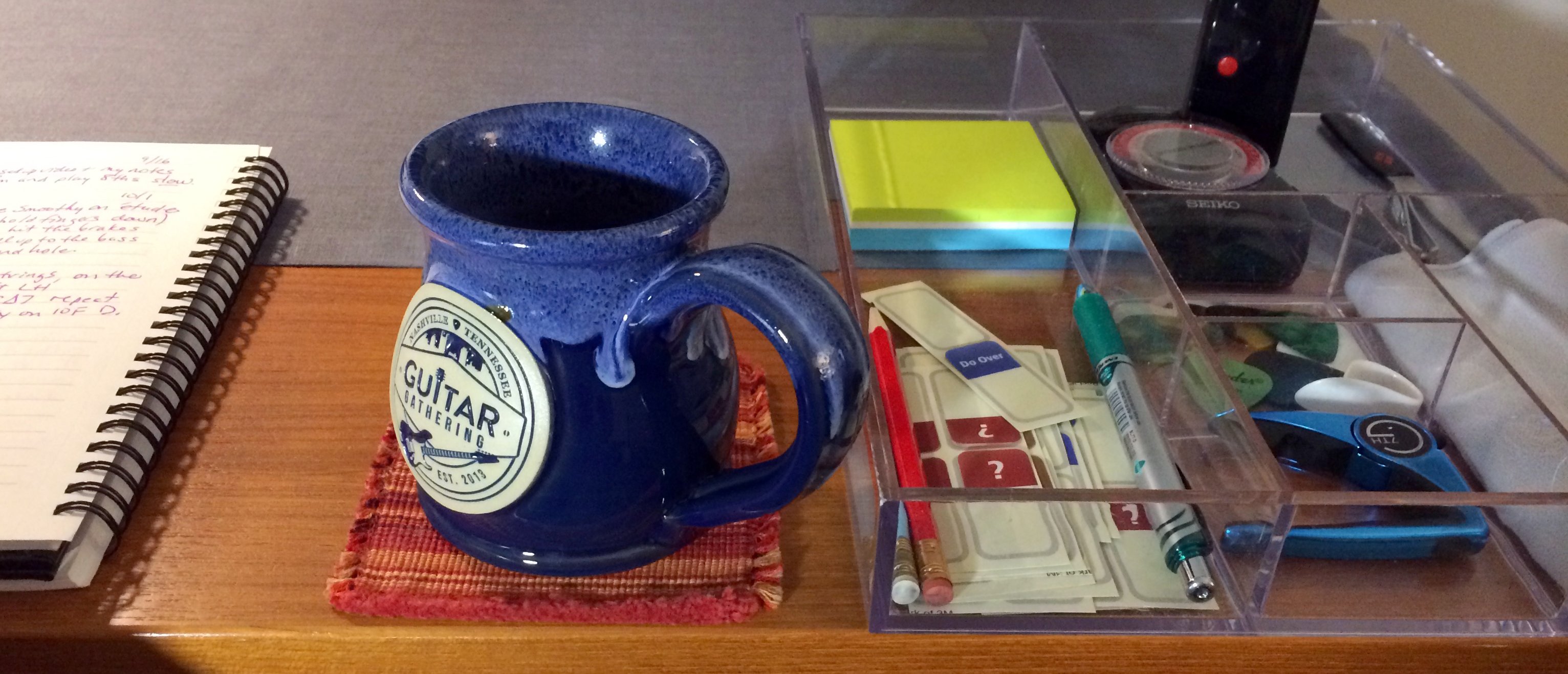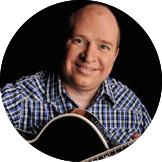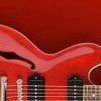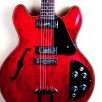-
Posts
919 -
Joined
-
Last visited
-
Days Won
255
Content Type
Profiles
Forums
Gallery
Events
Articles
Blogs
Downloads
Community Map
Posts posted by DianeB
-
-
@FTB23 Hi there! Congrats on a good start. Like many wise teachers, Steve starts the course with very small bites to give the student a sense of progress. As you can tell from previewing the rest of the course, there are no more small bites with "Session" in their title. The sessions will now be more substantial and it will require significantly more time to complete them.
Do not be deterred. Create your own small bites. Ignore the "recommended times to complete", as they are unrealistically brief for most students. It will take as long as it takes. Keep your attention on the process, not the goal, and you are in for a long and happy guitar journey.
-
 2
2
-
-
@Colleen Hi, Colleen. You might find the videos for 3 & 4 at Crowd Guitar. Another option is to call Legacy Learning Systems (615-515-3600 or 615-515-3605) and see what they can do for you.
-
Also among the casualties, as many are already aware: CAAS 2020 and Summer NAMM.
-
From Kaufman's website:
It Is With Deep Sadness That We Must Announce The Postponement Of The 25th Steve Kaufman’s Acoustic Kamps, Which Was To Be Held June 14-20, 2020 And June 21-27 At Maryville College, Maryville TN.New Dates Are June 13-19, 2021 For Old Time And Traditional Week And June 20-26, 2021 For Bluegrass Week.
Our Primary Consideration In Making This Decision Is The Safety And Health Of All Our Kamp Students, Staff, Our Community And The College Staff. Given The Significant Uncertainty About The Progress Of The COVID-19 Pandemic, It Appears Increasingly Likely That The Crisis Will Continue Through June And Beyond. Considering This, We Believe The Safest Option Is To Postpone This Year’s Kamp And Begin Working Towards Making 2021 The 25th Steve Kaufman’s Acoustic Kamp And The Best Year Ever!-
 1
1
-
-
@Strings In the Fingerstyle course lesson book, there are basic, intermediate, and full versions of "Ode to Joy". If you're interested, let me know, and I'll send it by private message. I don't think Steve would mind.
-
-
@Greg800 Yes, Greg, that lesson aired March 24. I don't see it posted either. It's possible that Steve wasn't satisfied with the audio and wanted to retape it.
In brief, he suggested that you choose a note, say C, and find every C on each string all over the fretboard. Say it and play it. In a couple of days, look for the C's and now the G's. Continue adding notes as you go by fifths or fourths.
I've caught myself doing a form of this. Sometimes when I'm in the middle of his major scale mastery workout, I'll pause and think: ok, Eb scale next. Find all the E flats. It helps.
-
1 hour ago, NeilES335 said:
"As a man thinketh in his heart, so is he" Book of Proverbs, chapter 23, verse 7:
Now, that is classic Canadian humor!
-
@Randy120 Ha! Yeah, Randy, once I pushed my eyes back into their sockets, I had a good laugh at that. And I'm better now at stopping before frustration sets in. I take smaller bites of the challenging stuff. Hope all is well with you.
-
 1
1
-
-
Forgive me for repeating this, but it's spot on Randy's topic, and maybe you missed it before. It's a podcast by Brent Vaarstra of "Learn Jazz Standards": Why I Stopped Hating My Playing. Bonus treat: at 4:00, you'll hear me take a bucket of cold water squarely in the face. Thanks, Brent. A little blunt, but I needed that.
-
 1
1
-
-
Update: Steve reported in the chat Friday that Bob has cancelled his travel plans. So he will not be coming to Nashville for the Live Lesson as scheduled.
From Steve's Facebook page, Saturday: But we will have our normal Tuesday night live lesson this week talking about Ways to Practice Scales Like a Boss and answering questions about the Triad series. See you there. - Steve
-
@Dave White Wonderful! And $20,000 for IOJ will bring a lot of joy into the world!
-
 1
1
-
-
From The Guardian: "The road will kill you": Why older musicians are cancelling tours
"Health concerns have caused a number of high-profile singers to quit the road but what will it all mean for the industry at large?"
-
 4
4
-
 1
1
-
-
I used Acrobat to combine the three triad PDFs (major, minor, and sevenths) into a single 5.6 Mb file, attached here for convenience.
-
 3
3
-
 7
7
-
-
@Daveguitar_61 If I understand your question correctly, yes, in a harmonized B natural minor scale the fifth is a v minor (F#m = F#-A-C#). But in the context of this example, we have a specific form, that of "Hotel California," with a descending B-A#-A-E line. That specific fall requires F# major (F#-A#-C#). Felder used a common flamenco (but not pop) progression. Its working title was "Mexican Reggae". Of course, Henley and Walsh shaped it into the rock standard we all know, but in later years, the band returned it to its acoustic, flamenco-flavored origins.
-
Hello, @Preetam, and welcome to the forum! I will assume you are just starting out with guitar. I hope you will take some time to learn about good posture and the ergonomics of playing guitar. The Musician's Way website is a good start. The object is to be aware of your entire body, and which muscles are in use for supporting weight, providing balance, and musical control. For now, think of your arm, including the shoulder, as an extension of your hand. The thumb normally provides stability while the fretting fingers apply the minimum required force. The wrist, elbow, upper arm, and shoulder should distribute the weight. The fretting fingers should touch the strings on their tips, not their pads. And this is all easier said than done!
-
 1
1
-
-
Recently I’ve read some new books that might be of interest. These are oriented toward general self- or skill improvement, not necessarily music, although music skills are well represented. I found valuable nuggets in each. One of these might perk up your practice, as they did for mine.
If you enjoyed the late George Leonard’s Mastery (1991), I encourage you to follow up with his equally concise companion volume, The Way of Aikido (1999). It provides the backstory to the aikido lessons in Mastery, and we learn what it’s like to become a newly minted black belt. (Hint: You start over.)
From the NYT best seller list we have James Clear’s Atomic Habits (2018) — build good habits and break bad ones. Chapter One alone is worth the price. Also well reviewed is Peak: Secrets from the New Science of Expertise (2017) by Anders Ericsson and Robert Pool.
And we have a pair from co-authors Brad Stulberg and Steve Magness, who have made new careers of studying the research on performance: Peak Performance: Elevate Your Game, Avoid Burnout, and Thrive with the New Science of Success (2017). In writing that book, they discovered that burnout was a subject in itself. They tackle the issues that arise specifically from following your passion in The Passion Paradox (2019).
To borrow author Tom Peters’ phrase from a related context, “there is an eerie similarity of language” among all these authors’ findings and recommendations. I heard the same themes echoing again and again: Deliberate practice. Consistency. Self-awareness. Tradeoffs. Challenge.
Warnings abound: The object of your passion can consume and crush you. Feedback is healthy, but pursuing external validation is a fool’s errand. Rest — short, medium, and long term — is a biological necessity for growth.
The principles apply to learning guitar or improving at almost anything. The links above go to Amazon, but first check your local library. Enjoy!
-
 2
2
-
 2
2
-
-
@kenneth It's good that you're mindful of pick direction. The choice depends to some degreee on what's happening in the music: alternating bass? string skipping? and such. At this stage I'd encourage you to use alternate picking (up-down-up-down) as much as possible. It's hard to acquire speed if one's picking is all up or downstrokes.
-
 3
3
-
-
Thanks, Mandy. On this theme, give a listen to Brent Vaarstra's podcast on Learn Jazz Standards: "Why I Stopped Hating My Playing". You can skip over the initial announcements to about 4:00, where you will hear the sound of me taking a bucket of cold water squarely in the face. Enjoy! I have to towel off, again.
-
 2
2
-
-
@josev The key of G major (or E minor) is indicated on the treble clef with a single sharp on the F line. All notes on the F line are played F#, because that is what the interval pattern of a major scale (M2 - M2 - m2 - M2 - M2 - M2 - m2) requires if the tonic (first pitch on the scale) is G. So a G major scale is: G - A - B - C - D - E - F# - G. If a natural sign appears in front of an F in that piece of music, the sharp is canceled for the duration of that measure and F natural is played. This same key signature might also signify E (relative) minor, which employs the same pitches but starts on the sixth scale degree and follows a different interval pattern (M2 - m2 - M2 - M2 - m2 - M2 - M2): E - F# - G - A - B - C - D - E.
At first, learning this will seem like raw memorization. In truth, there is much underlying symmetry, and as you become better acquainted, the patterns will emerge. Stick with it!
-
-
@Cathlabrob Hi, Rob, and welcome to the forum! Humidity issues are a regular topic around here, and Greg will almost certainly cover the subject. Meanwhile, here's the thread with some potentially useful tips, links, and videos.
-
@Steve Krenz Maybe I was seeing things, but this morning I was sure I saw a comments field there after your test. Now it's gone.
-
Oh, no, no, no. The tears are starting. Paul was one of the sweetest, most generous, most soft-spoken men I've ever known. I will always remember him sitting with me outside Third and Lindsley in the late afternoon sunshine, chatting and waiting for the show, only weeks before he discovered his illness. I followed his blog over the months with hope, growing apprehension, and sheer astonishment at his courage and candor. He took the picture of me over there. I'm heartbroken to have to say goodbye.
-
 1
1
-







Spiral Bound Song Hits Lesson Book
in Learn & Master Song Hits
Posted
Hello, Jose,
I wanted to check on something, but I see Doug already has the answer.
I bought the Song Hits a few years ago, and I could remember taking the printed book to the print shop to have it spiral bound. What I could not recall was whether there was a PDF of the book on one of the discs. There is not, for the reason Doug mentioned. It contains licensed excerpts from copyrighted material, and for Steve to include a PDF would presumably have been a violation of the licensing agreement.
As Doug said, your best option, regrettably, is to contact Legacy (615-515-3605 or 615-515-3600) and request a replacement. They might ask for proof of purchase, or require you to purchase a full set. Sorry.
I don't fault you for asking, but however well meaning our fellow forum members might be, to scan and redistribute the published book would likely amount to a copyright violation. Even if it were between two third parties, like you and myself, it would necessarily involve Steve, and we don't want that. He's a Nashville pro, and we want him to stay in the good graces of the town's legal eagles.